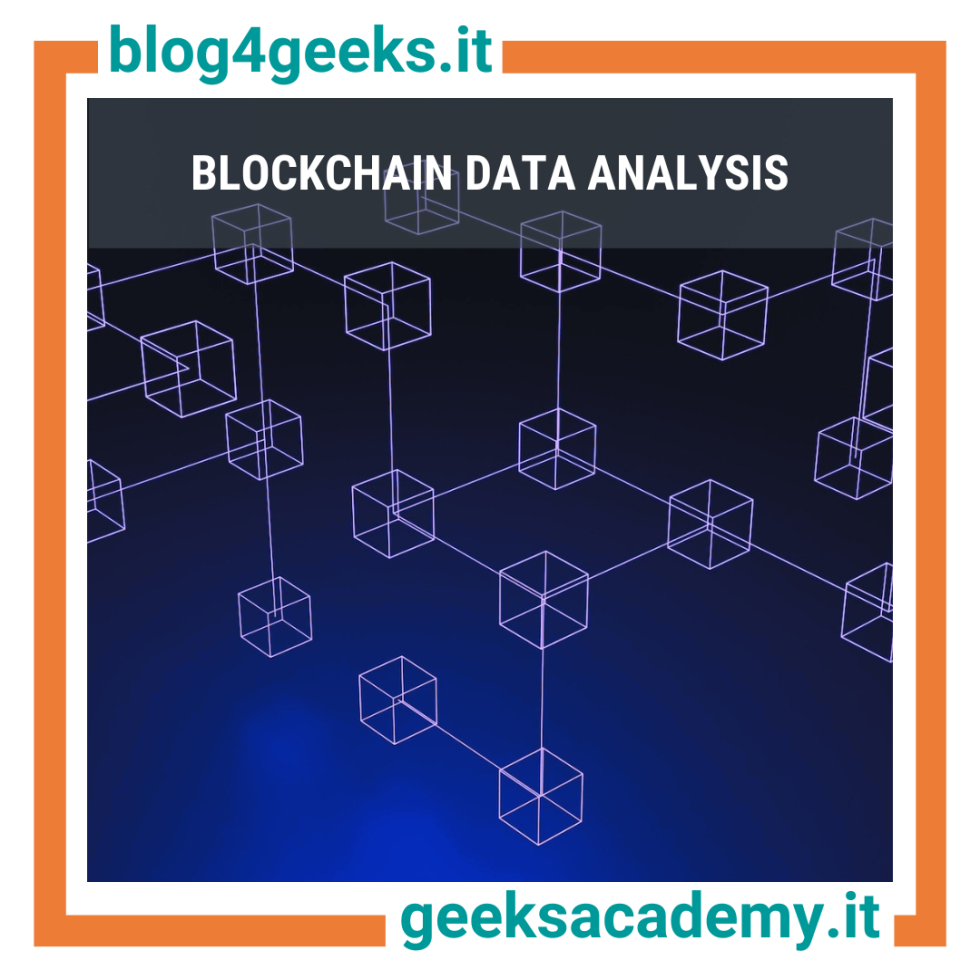
Discover Geeks Academy’s articles on: Blockchain, Coding, Cybersecurity, Cloud, Big Data, Artificial Intelligence, Gaming, Digital Innovation
Blockchain Data Analysis is the process of analyzing data stored on a blockchain. Thanks to data analysis, it is possible to extract useful information and models from the blockchain. The blockchain is a DLT (distributed ledger technology), a distributed ledger that stores transactions in a decentralized way, making it difficult to analyze the data stored at first glance.
Blockchain data analytics involves the use of various tools and techniques to extract information from blockchain networks, such as Bitcoin, Ethereum, and others. Thanks to data analysis techniques and methods, such as machine learning, data visualization, it is feasible to analyze a blockchain. Today, so many small, medium and large enterprises are willing to implement blockchain technology into their businesses.
Integration
There are multiple reasons why a business might integrate blockchain technology. It is important to identify the reasons before taking a decision and the consequences of adopting a blockchain in your business:
- Solving an issue: a problem in your business that a blockchain could potentially solve.
- Choosing the right blockchain: once you have identified your problem, determine which blockchain is best suited for your needs. Bitcoin, Ethereum, Avalanche? Proprietary Blockchain? There are so many options.
- Develop or customize smart contracts: smart contracts represent agreed actions that are automatically activated upon reaching specific parameters written on the contract. These actions are recorded on the blockchain. Therefore there will be a need to develop from scratch or customize existing smart contracts, in order to automate the business process that you want to improve.
- Integrate the blockchain into your business processes: once the smart contracts have been developed, the next step is to integrate the blockchain you picked into your system. This may involve developing APIs or other interfaces to allow existing systems to interact with the blockchain.
- Testing phase: you need to test the blockchain thoroughly to make sure it works as expected.
- Maintenance and updates: once the blockchain has been implemented, it needs maintenance and regular updates. This may involve fixing bugs, adding new features or updating smart contracts in order to reflect changes in business processes.
Yet why should a company integrate a blockchain in its workflow?

Use cases
The application of the blockchain technology in your work environment might generate significant benefits for your business, including:
- Fraud detection and prevention: by analyzing blockchain patterns and transactions, fraudulent activities such as money laundering, insider trading, and other illegal activities can be detected.
- Supply chain management: blockchain data analytics can help companies track products along the supply chain and identify potential bottlenecks or inefficiencies in the process.
- Identity verification: blockchain data can be used to verify identity information, such as verifying that a person has a particular credential or that a document is authentic.
- Risk management: blockchain data analytics can help businesses assess risk and make informed decisions based on data analytics.
- Smart contract analysis: by analyzing smart contracts code, it is possible to identify bugs or other problems that could lead to the malfunctioning of the contracts.
The future is Big Data
During the past years, the total amount of data created has soared, mostly due to the expansion of the Internet of Things (IoT). The data market is therefore growing dramatically and, according to the latest estimates, is going to reach a value of $103 billion by 2027. Here are some figures about the world of data:
- Businesses generate approximately 2,000,000,000,000,000,000 bytes of data per day.
- 97.2% of companies invest in AI and Big Data.
While the numbers speak for themselves, companies struggle to keep up with the ceaseless creation of new data:
- About 95% of companies report an inability to understand and manage unstructured data.
- Only about 26% of companies say they have achieved a data-driven culture.
Don't live the future as a sidekick... be a superhero! Discover Geeks Academy’s training offer in AI & Big Data: